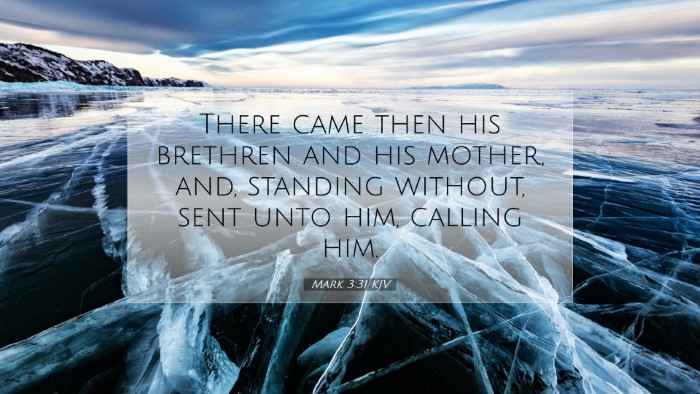Commentary on Mark 3:31
Verse: "Then His mother and His brothers came, and standing outside they sent to Him, calling Him."
Introduction
The context of Mark 3:31 is vital for a deeper understanding of this passage. This verse occurs during a pivotal moment in Jesus' ministry, where His popularity is rising, leading to both followers and adversaries. The coming of Jesus' family to see Him raises significant questions about familial relationships, loyalty, and the nature of discipleship.
Insights from Public Domain Commentaries
Matthew Henry's Commentary
Matthew Henry observes that this passage introduces a junction of Jesus’ earthly family and His spiritual family. The arrival of His mother and brothers signals a concern from His family regarding His actions and the intensity of His ministry. Henry comments that this underscores the tension between earthly ties and spiritual commitment. The implication here is critical: those who follow Jesus must sometimes redefine their relationships in the light of His calling.
Family Relationships
Henry stresses that while family bonds are vital, they must yield to the greater call of God. He writes, "The bonds of grace are stronger than the bonds of nature." This highlights the notion that spiritual ties among believers transcend natural family connections. This was revolutionary in a culture where family loyalty was paramount.
Albert Barnes' Notes on the Bible
Barnes expands on the significance of Jesus’ family coming to see Him. He notes that this occasion illustrates the misunderstanding that can arise between Jesus and those closest to Him. They may have come to restrain Him due to concerns for His well-being, as they were astonished at His teachings and miracles during a time of escalating conflict. He emphasizes that this moment raises critical theological implications regarding the nature of Jesus' mission.
The Nature of Discipleship
Barnes points out that true discipleship may put one at odds with earthly ties. The spiritual kinship formed through faith is elevated over blood relations, resonating with Jesus’ teachings in Matthew 10:37-39, where He states that no one is worthy who loves father or mother more than Him. This stark insight serves as a serious admonition for those reading this passage:
- Prioritization of Spiritual Family: Believers are called to prioritize their commitments to Jesus above all else.
- Misunderstanding and Rejection: Just as Jesus faced misunderstanding from His family, so too may His followers face similar challenges.
Adam Clarke's Commentary
Clarke’s insights dive deep into the cultural significance of the narrative. He elucidates on the traditional Jewish customs relating to family honor and public behavior. The act of Jesus' family seeking Him, specifically inquiring about His whereabouts, serves as a poignant reminder of their concern for His status in society. Clarke asserts that this reflects the perennial struggle faced by those dedicated to a higher call amidst familial expectations.
The Conflict of Interests
Clarke highlights that Jesus was not actively neglecting His earthly family but sought to elevate spiritual family against cultural expectations. He explains that their attempt to reach Him signifies the challenge of living as a follower of Christ, often in contrast to familial expectations. Clarke writes, "Christ came to gather a family of believers who would love Him above every earthly bond." This conviction pushes believers to examine their allegiances and understands the profound implications of Jesus’ statement later, indicating who truly constitutes His family.
Theological Reflections
As we complement these insights, several theological reflections emerge from Mark 3:31:
- Redefining Family: The narrative urges a radical redefinition of family through the lens of faith. In the Gospel's context, those who do the will of God are termed as His kin, establishing a new paradigm in relationships.
- Call to Commitment: Jesus' work often places His followers in challenging situations where they must choose between earthly ties and divine purposes. This choice echoes through centuries and remains applicable today.
- Understanding Misunderstanding: The confusion surrounding Jesus’ mission, as exhibited by His family, reflects the challenges faced by the Church in comprehending God’s will amidst social pressures.
Practical Applications
For pastors, theologians, and students of the Word, Mark 3:31 serves not only as a historical account but also as a source of practical guidance:
- Encouragement for the Isolated: Believers who find themselves at odds with their families for their faith can find solace in Jesus’ experience.
- Emphasis on Spiritual Community: The church should foster a familial atmosphere where spiritual kinship is celebrated and nurtured.
- Personal Reflection: Consider one’s priorities; where do the allegiances lie, and how do they reflect one’s discipleship?
Conclusion
Mark 3:31 challenges us to delve into the nature of our relationships and the level of our commitment to Christ. When taken within the broader narrative of the Gospel, it is a powerful reminder that following Jesus may require reevaluating personal and familial bonds. This passage poignantly reflects the tension between earthly obligations and heavenly callings, essential for anyone engaged in theological reflection.


